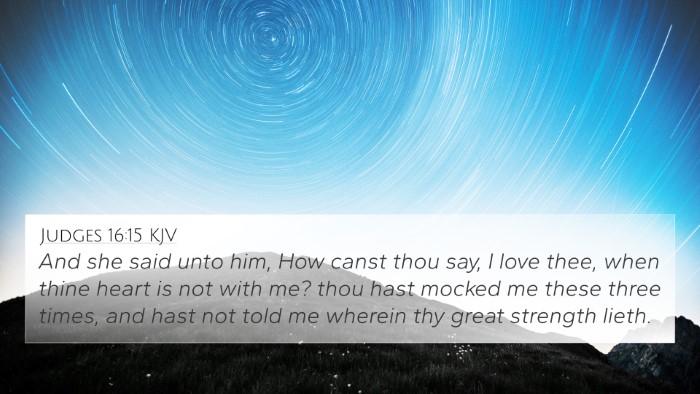Ezekiel 16:30 - Summary and Interpretation
Ezekiel 16:30 reads: "How weak is thy heart, saith the Lord God, seeing thou doest all these things, the work of an imperious whorish woman!" This verse is part of a larger passage where God, through the prophet Ezekiel, addresses the unfaithfulness of Jerusalem symbolically portrayed as an unfaithful wife. The intensity of God’s emotions is highlighted here, emphasizing His hurt and disappointment.
Meaning and Insights from Various Commentaries
The interpretation of this verse can be drawn from notable public domain commentaries, which together provide a comprehensive understanding.
Matthew Henry's Commentary
-
Matthew Henry emphasizes the spiritual infidelity of Israel, likening it to the deceit and betrayal of an unfaithful spouse. He discusses how the nation has turned to idolatry and disobedience, provoking God's wrath.
-
He points out that the weakness of heart refers to Israel’s lack of strength in resisting temptation, highlighting a failure to uphold covenant with God.
Albert Barnes' Notes on the Bible
-
Barnes elaborates on the phrase "how weak is thy heart" by analyzing the emotional state of the people, asserting that such weakness stems from a failure to recognize their own sinfulness and the real nature of their relationship with God.
-
He also discusses the consequences of idolatry and the need for repentance, interpreting this verse as a profound warning against falling into the traps of worldly desires.
Adam Clarke's Commentary
-
Clarke provides an insightful historical context, asserting that the unfaithfulness addressed in this passage serves as a foreshadowing of God's judgment upon His people for their transgressions.
-
He highlights the metaphorical usage of the term "whorish woman" to symbolize the nation's betrayal and warns against spiritual laxity and violation of divine orders.
Cross-References Related to Ezekiel 16:30
This verse can be cross-referenced with several other key Bible passages that elaborate on themes of unfaithfulness, idolatry, and the emotional aspect of God's relationship with His people. Here are some notable examples:
- Hosea 1:2 - Hosea's marriage serves as a parallel metaphor for Israel's unfaithfulness.
- Jeremiah 3:6-10 - Discusses Israel's infidelity and God's response through the prophet Jeremiah.
- Ezekiel 23:37-39 - Continues the metaphor of unfaithfulness and the consequences thereof.
- Isaiah 54:6 - Speaks of God as a husband to an unfaithful bride while offering hope of restoration.
- Revelation 2:14 - Warns against allowing false teachings and immoral practices within the church.
- 2 Corinthians 11:2 - Paul expresses his concern for the Corinthian church's purity in relation to their faithfulness to Christ.
- James 4:4 - Describes friendship with the world as enmity against God, alluding to spiritual unfaithfulness.
- Matthew 12:39 - Jesus speaks of an evil and adulterous generation, tying back to unfaithfulness to God's commands.
- Proverbs 6:26-29 - Warning against the snares of immorality, echoing the consequences of unfaithfulness.
- Romans 7:4 - Discusses our union with Christ, paralleling the themes of covenant faithfulness.
Understanding and Application
Reflecting on Ezekiel 16:30 within its broader context offers deep insights into the nature of human relationships with God. It serves as a critical reminder of the seriousness of idolatry and the implications of turning away from the Creator. Adopting a posture of humility and recognition of our spiritual state is essential in nurturing our relationship with God.
By utilizing tools for cross-referencing, such as a Bible concordance or a Bible cross-reference guide, readers can engage in a cross-reference Bible study that strengthens their understanding of key themes across scripture.
Conclusion
Ezekiel 16:30 reflects not just a historical and cultural moment, but also a timeless truth about the nature of divine love and how it contrasts with human unfaithfulness. Through a comprehensive analysis that includes scriptural cross-referencing and thematic connections, believers can deepen their faith and commitment to God.












